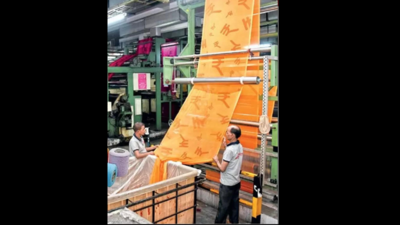- News
- City News
- ahmedabad News
- Gujarat rolls out Textile Policy 2024: Key details here
Trending
Gujarat rolls out Textile Policy 2024: Key details here
The Gujarat govt has launched the Textile Policy 2024, introducing substantial subsidies on capital investment and power tariffs. Highlights include 10-35% capital investment subsidies, interest subsidies of 5-7%, and payroll assistance for workers. The policy aims to boost MSMEs, attract investments, and support skilling, promoting a competitive and sustainable textile sector.

The enhanced incentives in capital and interest subsidies, payroll assistance and reduced power tariffs are expected to particularly benefit these labour-intensive sectors.
Marking a major advancement from 2012 and 2019, the policy, in a first, offers subsidies of 10% to 35% on the eligible Fixed Capital Investment (eFCI), capped at Rs 100 crore.


Industry leaders called the policy a ‘bold and comprehensive' one that will give the industry a competitive advantage, attract fresh investments, support MSMEs in expanding their operations and promote innovation.
To encourage skilling and upskilling of workers under self-help groups, the policy provides for training assistance of Rs 5,000 each per month for three months and provides payroll assistance for every worker upto 25% of their job work value turnover limited to Rs 5,000 a month for five years.
Announcing the policy, chief minister Bhupendra Patel stated, "Gujarat has long been a powerhouse in textile production, earning the titles of Textile State of India and Denim Capital of India.
The Gujarat Textile Policy 2024 is a progressive step toward further empowering the industry, ensuring Gujarat remains a global leader while promoting economic opportunities for women and youth. This policy lays the foundation for a sustainable and competitive textile sector."
Another first for the state is a tariff subsidy of Re 1 per unit (kWh) for industries availing power either from distribution companies (discoms) or using renewable energy through open-access for a period of five years from the date of commencement of production (DoCP) will benefit from this scheme.
The policy also offers support for quality certification, energy and water conservation and technology acquisition. It includes enhanced fiscal subsidies tailored to labour-intensive units, with special incentives for those employing 4,000 or more workers.
Beyond apparel, garments and technical textiles, the policy extends its focus to sectors like weaving, knitting, dyeing, texturizing, twisting and the production of yarn from polyester staple fiber (PSF) and viscose staple fiber (VSF), excluding cotton and synthetic filament yarn spinning.
The enhanced incentives in capital and interest subsidies, payroll assistance and reduced power tariffs are expected to particularly benefit these labour-intensive sectors.
End of Article
FOLLOW US ON SOCIAL MEDIA










